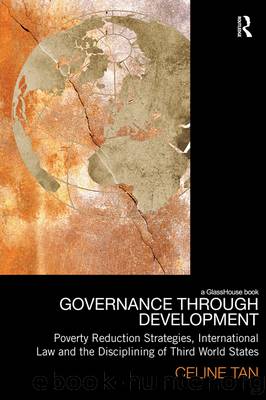Governance Through Development by Tan Celine;

Author:Tan, Celine;
Language: eng
Format: epub
ISBN: 668431
Publisher: Taylor & Francis Group
4.5.3 Increasing Institutional Leverage
Critics have argued that the front-loading of conditionality discussed above significantly increases âthe leverage of Management and staff vis-Ã -vis the governments of developing countriesâ (Babb and Buira, 2004: 14). The Bank, for example, states that under the PRSC approach â[t]raditional conditionality has been replaced by a performance framework that reflects an understanding between the Bank and the government on the priorities of the countryâs reform programs and the financing requiredâ, with the Bank requiring âtangible evidence of progress in achieving the objectives of the medium-term programâ before each PRSC operation is approved (World Bank, 2005b: para. 11, emphasis added).
This implies a high degree of negotiation between the Bank staff and country authorities prior to the entry into force of a financing agreement regarding the institutional and policy actions to be undertaken in exchange for disbursements. In particular, there is extensive focus on the countryâs public financial management and expenditure systems, with all PRSCs being âunderpinned by ex-ante fiduciary assessment[s]â of these systems in order to identify what the Bank perceives to be âdeficienciesâ, âfiduciary riskâ and âsteps needed to secure acceptable fiduciary arrangementsâ (World Bank, 2005b: para. 72). Countries are expected to secure changes, including legal or regulatory reforms37 or institutional reforms,38 before disbursements are made, blurring the line between âactual conditionalityâ and ânegotiated policy actionsâ.
IMF staff have admitted that the use of prior actions obscures the actual number of conditionalities that may be present in a financing arrangement due to the numerous ways in which conditionality may be manifested through the use of prior actions (interview: Plant, 2004).
At the World Bank, the use of ex-ante conditionalities is compounded by the extensive use of Country Assistance Strategies and the CPIA index (see section 4.3.2) to determine access to financing. While these requirements do not constitute fiduciary conditions per se, these prerequisites provide a greater incentive for countries in need of external financing to implement the policies set by the BWIs, as access to financing is limited until the required reforms or pre-qualification criteria are complied with. Contrast this with conventional conditionality, whereby financing is agreed upon subject to compliance with certain conditions, non-compliance with which may or may not result in the suspension of disbursements, depending on the outcome of a waiver application. Once again, this concentrates more power in the hands of the institutional staff and management as countries are pressured into adhering to CPIA policy prescriptions for continued access to external financial support (Alexander, 2004: section III).39
Country selectivity under the new framework of conditionality thus amplifies the political and often ideological nature of aid relationships. Countries have a financial incentive to institutionalise the policy environment expected of them by the Bretton Woods institutions and to present such reforms as part of a domestic reform package undertaken voluntarily in order to demonstrate their willingness to engage with the international community on the established terms of engagement (see Chapters 2 and 5). This repositioning of traditional conditionality performs a significant restraining function at the level of the Executive Board.
Download
This site does not store any files on its server. We only index and link to content provided by other sites. Please contact the content providers to delete copyright contents if any and email us, we'll remove relevant links or contents immediately.
Sociological Perspectives of Health and Illness by Constantinos N. Phellas(440)
Adding Value to Policy Analysis and Advice by Claudia Scott; Karen Baehler(435)
Race and American Political Development by unknow(430)
Human and Global Security : An Exploration of Terms by Peter Stoett(416)
American Government and Politics Today by Steffen W. Schmidt Mack C. Shelley Barbara A. Bardes(395)
Control Of Oil - Hardback by Kayal(391)
The Catholic Church and European State Formation, AD 1000-1500 by Jørgen Møller(348)
The World According to China by Elizabeth C. Economy(328)
Left Is Not Woke by Susan Neiman(323)
Entrepreneurship Education and Training: The Issue of Effectiveness by Colette Henry Frances Hill Claire Leitch(316)
Materializing the Middle Passage by Jane Webster;(303)
Theories of Counseling and Psychotherapy: A Case Approach by Nancy L. Murdock(299)
Advances in Child Development and Behavior, Volume 37 by Patricia J. Bauer(289)
Turkey's Relations with the West and the Turkic Republics: The Rise and Fall of the Turkish Model by Idris Bal(288)
Cross-Cultural Child Development for Social Workers by Lena Robinson(286)
Japan's Ainu Minority in Tokyo by Mark K. Watson(285)
Laboratory Life by Bruno Latour(282)
Beyond Service: State Workers, Public Policy, and the Prospects for Democratic Administration by Greg McElligott(275)
The Oxford Handbook of Museum Archaeology by Stevenson Alice;(265)
